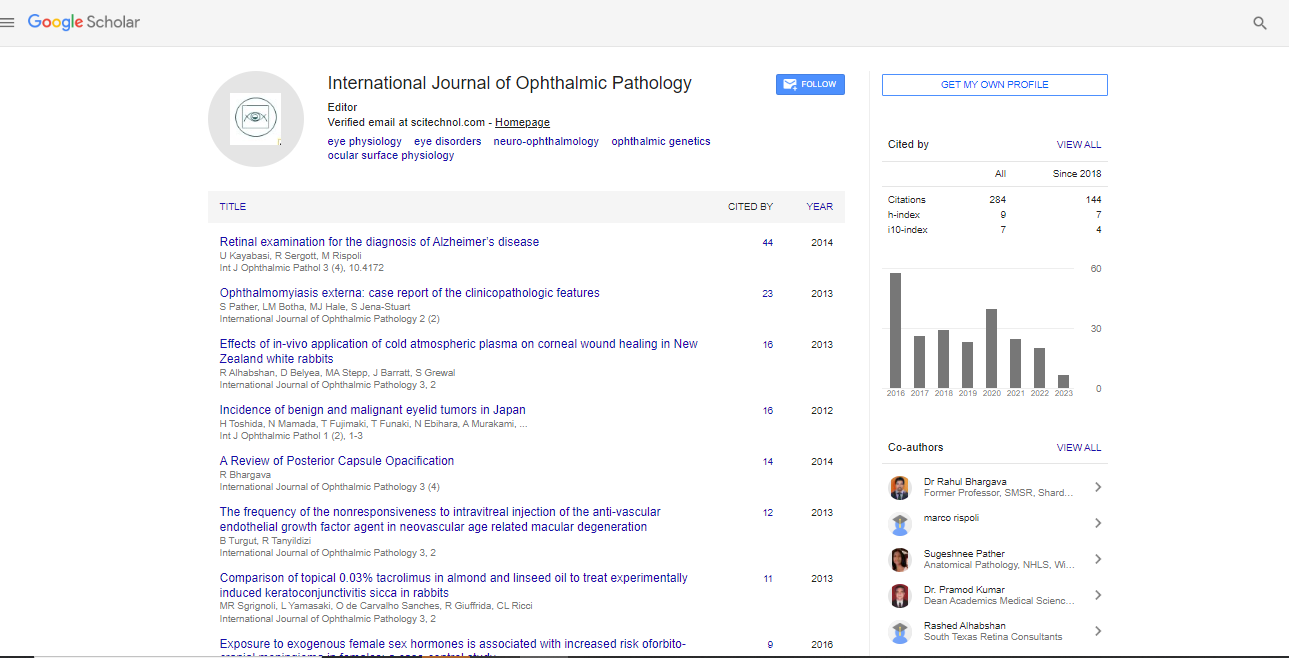Perspective, Int J Ophthalmic Vol: 9 Issue: 6
Eye Parasites, Treatment and Symptoms
Akhila Sabbineni*
Department of Microbiology, Andhra University, Vishakhapatnam, India
*Corresponding Author:
Akhila Sabbineni
Department of Microbiology
Andhra University, Vishakhapatnam, India
E-mail: akhilasabbineni777@gmail.com
Received: December 02, 2020 Accepted: December 16, 2020 Published: December 23, 2020
Citation: Sabbineni A (2020) Eye Parasites, Treatment and Symptoms. Int J Ophthalmic Pathol 9:6. (254)
Abstract
A parasite is Associate in an organism that lives in or on another organism, that is named as the host. Through this interaction, the parasite receives advantages, like nutrients, at the expense of the host. Some parasites will infect humans, inflicting a parasitic infection. They generally enter the body through the skin or the mouth. Once within the body, these parasites will trip different organs, together with the eyes.
Keywords: Eye Parasites
Introduction
A parasite is Associate in an organism that lives in or on another organism, that is named as the host. Through this interaction, the parasite receives advantages, like nutrients, at the expense of the host. Some parasites will infect humans, inflicting a parasitic infection. They generally enter the body through the skin or the mouth. Once within the body, these parasites will trip different organs, together with the eyes.
Symptoms of Eyelid Cancer
Parasitic eye infections don’t continuously cause symptoms, which might create them onerous to acknowledge.
When symptoms do occur, they will include:
• eye pain
• redness or inflammation within the eye
• excessive tear production
• blurry vision
• the presence of floaters in your field of vision
• sensitivity to lightweight
How parasitic eye infections treated?
Treating a parasitic infection depends on the kind of parasite that’s inflicting the infection. however, many varieties area unit treated with oral or topical medications, like pyrimethamine, ivermectin, and diethylcarbamazine.
In some cases, adult worms can have to be compelled to be off from your eye. this can be a typical a part of the treatment of loiasis, gnathostomiasis, and infestation.
Prevention
While it’s onerous to fully avoid parasites, there are a unit many belongings you will do to scale back your risk of developing a parasitic infection in your eye.
Practice smart hygiene: Wash your hands of times, notably before intake, when exploitation the lavatory, and when learning animal waste. Avoid sharing personal things like garments, towels, and bed sheets.
Cook food properly: If you’re traveling in {an area Unit neighborhood, district, regional locality, vicinity a partial section} wherever parasitic infections are common, avoid intake raw or undercooked food. take care that everyone food is roast through to the right internal temperature. If you’re handling raw food, wear gloves and wash your hands later.
Prevent insect bites: If you’re progressing to go outside throughout times of the day once insects might bite you, apply Associate in Nursing pesticide to exposed skin or wear protecting wear.
If you wear contact lenses, don’t clean or store them with water. Use solely sterile product approved for cleansing contacts. once storing your contacts, replace the contact resolution within the case each time.
Conclusion
There are a unit several parasites throughout the planet which will infect humans. a number of these parasites will infect your eyes. A parasitic infection in your eye won’t continuously cause symptoms. However, if you notice any uncommon eye pain, inflammation, or vision changes, create a meeting with a doctor. Left untreated. some parasitic infections will cause permanent vision loss.
 Spanish
Spanish  Chinese
Chinese  Russian
Russian  German
German  French
French  Japanese
Japanese  Portuguese
Portuguese  Hindi
Hindi 